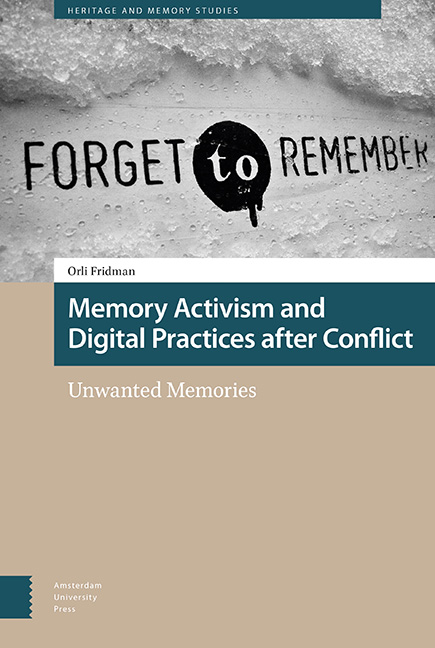Book contents
- Frontmatter
- Table of Contents
- List of Figures
- Preface
- Acknowledgements
- Introduction: Memory Activism and Alternative Commemorative Practices after Conflict
- 1 Unwanted Memories of (the Wars of) the 1990s
- 2 ‘Not in My Name’: From Anti-War to Memory Activism: The First Generation
- 3 ‘Too Young to Remember, Determined Never to Forget’: The Second Generation
- 4 Hashtag Memory Activism: Digital Memory Practices and Online Commemorations
- 5 Regions of Memory: The Post-Yugoslav Space as a Region of Memory Activism
- Epilogue: Unwanted Pasts in an Unresolved Present
- Appendices
- Bibliography
- Index
Appendix 4 - Women’s Court Invitation to Hear Public Testimonies in Sarajevo, May 2015
Published online by Cambridge University Press: 07 October 2022
- Frontmatter
- Table of Contents
- List of Figures
- Preface
- Acknowledgements
- Introduction: Memory Activism and Alternative Commemorative Practices after Conflict
- 1 Unwanted Memories of (the Wars of) the 1990s
- 2 ‘Not in My Name’: From Anti-War to Memory Activism: The First Generation
- 3 ‘Too Young to Remember, Determined Never to Forget’: The Second Generation
- 4 Hashtag Memory Activism: Digital Memory Practices and Online Commemorations
- 5 Regions of Memory: The Post-Yugoslav Space as a Region of Memory Activism
- Epilogue: Unwanted Pasts in an Unresolved Present
- Appendices
- Bibliography
- Index
Summary
Dear friends, associates and supporters,
with all due respect for your contribution t our joint efforts towards achieving peace with justice, on this occasion we invite you to join us in the Women's Court. The final event – public testimonies will be held in Sarajevo/Bosnia and Hercegovina from 7th to 10th May 2015.
The process of organizing of the Women's Court – a feminist approach to justice began in late 2010 and has been ongoing, and will also continue after the afore mentioned event.
With the Women's Court – a feminist approach to justice we create space for women's testimonies on the experiences of injustice and violence they underwent during the wars and in peacetime. Above all, we wish to create space for all the unacknowledged, concealed and silenced crimes , and also to shed light on organized resistance.
The regional initiative Women's Court – a feminist approach to justice was launched by 7 feminist organizations from all the countries of the former Yugoslavia.
In the course of a four-year period (2011-2015), we were engaged in intensive activities preparing the organization of the Women's Court – a feminist approach to justice. These activities involved creating a women network of solidarity of witnesses, activists, therapists, experts and artists coming from all the successor states of the former Yugoslavia. The aim of these activities is to create a feminist model of peace, justice and accountability.
With the Women's Court – a feminist approach to justice we contemplate and and create new policies of knowledge, we reconsider the relations between theory and practice/experience , we build mutual solidarity and trust, alternative women-s history and collective historical memory.
In solidarity,
The Organizing Committee of the Initiative for the Women's Court – a feminist approach to justice:
The Movement of Mothers of the Srebrenica and Žepa enclaves, Sarajevo, Foundation CURE, Sarajevo, Women's Forum, Bratunac, (Bosnia and Hercegovina), Center for Women Victims of War, Zagreb, Center for Women Studies, Zagreb, (Croatia), Slovenian Women's Lobby, Ljubljana, (Slovenia), Center for Women's peace Studies, Kotor, (Montenegro), Council for Gender Equality, Skopje, (Macedonia), Kosovo Women's Network, Priština, (Kosovo), Women Studies Center, Belgrade, (Serbia),Women in Black, Belgrade, (Serbia).
- Type
- Chapter
- Information
- Memory Activism and Digital Practices after ConflictUnwanted Memories, pp. 207 - 208Publisher: Amsterdam University PressPrint publication year: 2022

